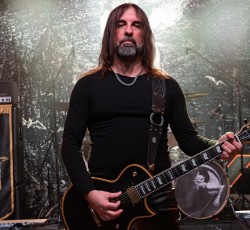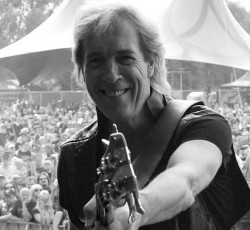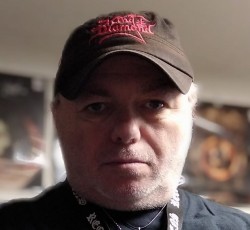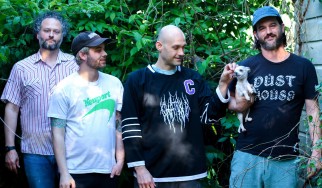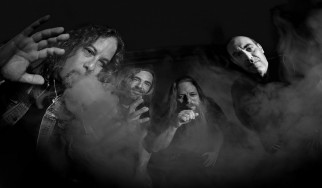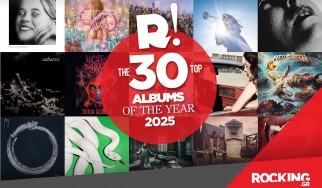Oxbow: "Fame and fortune are capricious bitches"
The iconic rock act breaks its 6 years’ silence with another wonderful record and we unravel the secrets of an amazing 35 years long career
It is my firm and constant belief that Oxbow is one of the most significant groups of non-conventional rock, a band that has truly offered a big deal in the art of music. "Love's Holiday" is their new, 8th album and is another extraordinary milestone of a remarkable 35 years long career. And while it may sounds less chaotic and noisy than their past endeavours, it still carries its own quality and magic.
As it happened the previous time we interviewed them, we were lucky enough to have a chat with Niko Wenner and Eugene Robinson but to receive also responses from Greg Davis and Dan Adams. With the whole band at our disposal, this was the best opportunity to talk about love, hell, of what it means to be true to your art and other secrets behind a very long musical adventure.

It's an honour to welcome you at Rocking.gr and congratulations on your wonderful new album! After so many creative years, do you (still) feel stressed or curious about how your fans will react?
Niko: Thank you! Yes, our records are very important to us, both very personal, and we put everything we are into them. So we do care what people think. It is also true that we make the records that -we- need to make, the songs, the sounds, that result, in a record -we- want to hear, first. While at the same time guiding our choices also to be logical, sensible, for people that have enjoyed our recordings in the past. It’s a delicate balance.
Eugene: I don’t remember who said it but their response to a question like this was that, if people don’t like it, they can join the billions of other people on the planet who neither know nor care about anything we do. That’s very general and very glib but I tend to think about it like this: I can understand you not liking it, however, you not liking it has nothing to do with how great it is. You might not like a meal I’ve made for you, but that meal could be award winning. So, it’s really just about taste. And no need getting stressed about that. Tastes vary. But beneath it all, I would hope that it makes people as satisfied as it makes me. Otherwise we’d never have made it.
Greg: Making music and worrying about how others will accept or reject it feels a bit foreign to me. On some basic level I only care about how I feel about the music. Of course this is also a lie to myself and, on some level, I am curious how people will react to the next thing we do. This is true for every record we have ever done. But I don’t think we let that curiosity influence what we are doing very much, at least I hope we don’t. Perhaps I’m lying to myself again?
I can understand you not liking something, however, you not liking it has nothing to do with how great it is
Could you tell us if there was anything different this time regarding the composing or the recording process? What is different - or even better - in "Love's Holiday" compared with other Oxbow albums?
Niko: One big difference is that for "Thin Black Duke" I wrote new music for each song in sequence with the existing lyrics. This time I took every high quality song that I could find, using old songs unused or unfinished from different eras and also starting many new songs. We eventually had a pool of 18 songs, from which we chose 9 that worked well together as an album, to create "Love’s Holiday". Old songs included “All Gone” and “Million Dollar Weekend” both of which I demoed 22 years ago, and “Lovely Murk” which I demoed 12 years ago.
If we are honest in the music we make, time changes us, and accordingly our view changes too. And so our music will naturally change as well
First it was the strings and the brass instruments, now it's the human voices: "Love's Holiday" has a very strong presence of many human voices, from your guests, the choir etc. How did you decide to experiment with extended vocals? What else is left for Oxbow to explore?
Niko: What remains, and is a constant, is to continue exploring our personal view of the world. This will always make our songs unique. If, as above, we are honest in the music we make, time changes us, and accordingly our view changes too. And so our music will naturally change as well. The choral vocals on this record started with my desire to have a choir on the song “All Gone.” From there, we decided to have massed backing vocals on other songs too, rather than the instruments , strings, woodwinds, brass, we’d used to fulfill a similar musical function in the past.
May I ask, how did the collaborations with Kristin Hayter and Roger Joseph Manning Jr. happen? And how do you feel with their contributions?
Niko: I was friends with Roger from before I filled in on guitar and backing vocals on some live gigs with his band Jellyfish back in the day. I had thought, just to myself, that Roger would be brilliant to sing backing vocals on “1000 Hours” and funnily enough Joe Chiccarelli suggested the same thing, much to my surprise. I made a vocal demo and sent it to Roger after we talked on the phone, and he added his own elements to create the unbelievably gorgeous multitrack vocals you hear. Kristin Hayter was also suggested by Joe Chiccarelli, to sing the melodic part I had written. Unlike Roger, I did not know her music before, which I now think is surprising. It was immediately obvious as soon as I listened to her recordings that a collaboration was an inspired idea. Similar to Roger, we spoke on the phone and I sent her my demo, in this case also the written score, and Kristin returned the startling beauty of her recording, including the her own bridge part and creating harmonies to my 2011 melody. Kristin performed an incredible elevation of what already was for me a very meaningful song.

In the past, you have collaborated with amazing artists - including the extraordinary Mr Peter Brötzmann that passed away recently. Could you pick a favourite collaboration? One that may have inspired or even redefined you as a band?
Niko: All our collaborations were and are unique, and special to me. Lately I think a lot about working with Peter because sadly we won’t see him again. I had strongly wanted to work with him even before we met socially in Wuppertal in 1991, and to make music together again since our performance in 2018. I had even picked a new song for Peter to record with us, for the next Oxbow record we are currently working on. The rehearsal and performance at the Moers Jazz festival in 2018 exceeded my very high hopes and expectations. Peter was kind and gentle, complimentary of the Oxbow songs we offered to collaborate on, and powerful, emotional, and razor sharp in his playing. Nothing more I could have wanted from this, other than to repeat! I’ll never forget Peter turning to me in rehearsal after we first completed a run through of "Angel." He said quietly, simply "That’s a very nice song." My fears of disdain for our sometimes simple key-based harmonies and melodies from this giant of free improvisation, disappeared.
Eugene: Lydia Lunch and Marianne Faithfull were both very significant for me in very many ways that are the same and very many that are different. Lydia just because of a lifelong obsession with Lydia and her overall professionalism and dedication to craft. Ms. Faithfull because it was all so very stressful that I am amazed that we even got it done.
I think "disturbing" sits at the juncture of where music and lyrics are most significant
Personally, I feel that the new album has the most refined Oxbow sound ever, but this doesn't necessarily mean that the music is less "disturbing". Would you agree?
Niko: Yes, the clarity in sound and structure works to deliver our message, feelings, and sentiments even more purely. And when the message is disturbing as it sometimes is, the result can be perhaps even greater than in the past. Anyway, good to know it’s working!
Eugene: I would agree. Besides which I think “disturbing” sits at the juncture of where music and lyrics are most significant. Everyone can hear what I am singing but the disturbing part comes in when you consider what I am meaning.
Greg: It’s interesting because I don’t find Oxbow music disturbing in the first place.
I don’t think any of us do, it’s certainly not disturbing to play or to record, or to perform quite the opposite. It’s true that disturbing themes are often touched upon but I don’t think that means it is disturbing music. Maybe removed from the joy of playing it would change my perspective but I still don’t think it is disturbing music. I think it can be challenging to listen to for lots of reasons both musical and thematic but I’m hoping you would find yourself excited or happy after hearing it. That’s how I feel playing it.
Detailing trips to hell and back, not like a tourist but more like a resident
The press release says that the album is practically a collection of "Love songs". Is it like you trying to explore the experience of Love from different angles? For example, love and abuse in "Lovely Murk", love and loss in "1000 hours" and so on?
Niko: “Lovely Murk” is not about abuse. All the music on Love’s Holiday is about love. These recent years I’ve seen the death of both my parents, the continued flourishing of my marriage, and the birth of our two children, and this is the love I explored in the music in Love’s Holiday.
Eugene: Not agape, not philia...but eros. This type of love and the idea behind "13 ways of looking at a blackbird". So, not TRYING to explore. And not exploring at all. Detailing trips to hell and back not like a tourist but more like a resident. As God, they claim, is love. This is our claim as well: it’s all love.

I feel very intrigued by the complex harmonies in "1000 Hours" and "Million Dollar Weekend". Can a strange harmony feel more visceral than loud, noise rock?
Niko: Sometimes. I think context and variation in methods is the key. For our recordings I like the way the varied timbre of different instruments and voices make the harmonies clear. In a live setting, volume/loudness, and distortion can naturally bring out overtones from just our guitar, bass, drums, and voice parts to imply some of these harmonies. Agreed, especially lately I like to provide unambiguous pitches in our recordings, and the winds and strings and various choirs in our recordings help provide that direct experience.
All in the band have input into what we create, and agree we aren’t in this for the money or status or coolness or hotness or credibility or scene-fitting or to avoid other aspects of life
35 years of Oxbow: what is the secret for such a long career? Is it friendship or something else?
Niko: We never had to argue about what to do with money. Because there has been none to speak of. Simple.
Eugene: Maybe a realization that like Buzz from The Melvins once said, this is hard and if you find people you can do it with that let you do it without killing them, you should keep doing it.
Dan: It’s a very rare opportunity to participate in a musical adventure like this band. All in the band are omnivorous appreciators of great music - regardless of style. All in the band have input into what we create, and agree we aren’t in this for the money or status or coolness or hotness or credibility or scene-fitting or to avoid other aspects of life or any other reason other than to make music we want to make. So, we are left with a situation where we can do just that. And we do just that as well and as much as we are able. Rather than one of us or some other force controlling to achieve some agenda or specific goal, it’s more like giving up enough control of the elements to allow the surprising sum to emerge. I don’t think any of us take this opportunity and outlet for granted. It’s a liberating musical situation even though there are certainly challenges, difficulties, struggles, differences of perspective in the practical aspects of what we do. In the end, when it ends, it’ll be the death of a good thing.
Can you pick the absolute best and the absolute worst moment for the band in these 35 years?
Niko: I believe it’s about keeping going and not dwelling on either the high or the low.
Eugene: Playing at Villette Sonique in Paris was fairly epic. Same with the Off Festival in Poland and the Brotzmann show in Moers. All very close to being amazingly great. The worst moment? Every/many moments that were not those... from playing to one person in Krefeld, Germany. In his living room. To the struggle involved in very different work styles.
Fame and fortune are capricious bitches. I think the road to madness starts with thinking about this WHY too much
You seem to be a band that always enjoyed critical praise but still remained mostly a respected "cult" act. Personally I think that you are one of the most underrated bands in rock history. Why do you think this happened?
Niko: Not really sure to be honest. My thoughts about this are too complex and perhaps ill-formed to delve into here.
Eugene: Fame and fortune are capricious bitches. I think the road to madness starts with thinking about this WHY too much.
Greg: The reasons could be endless or a simple one. We don’t really think about it.

Who were your biggest musical influences when you started as musicians? And secondly, are there new or younger artists that you find exciting?
Niko: One example of an early and continued influence is Jimi Hendrix. I’m digging again into his 1968 magnum opus Electric Ladyland to newly appreciate this gorgeous early example of a concept album. The British band Pupil Slicer are making very smart and viscerally affecting music right now. I really hope to see them play live soon.
Eugene: Little Richard, James Brown, James Chance, hardcore, disco... And yeah...I just started listening to The Viagra Boys, who I like quite a bit.
Regarding the ownership of intellectual property and paying creators properly for their work, I think the pendulum has lately swung far in the direction of exploiting the work of many, by a few
You have seen a lot of changes in the music industry in your career. What is your opinion on the current state of the industry?
Niko: Well… Regarding the ownership of intellectual property and paying creators properly for their work, I think the pendulum has lately swung far in the direction of exploiting the work of many, by a few. Said more simply, songwriters are being ripped off. I’m not talking about record labels, but mostly about streaming. We solved this problem before. Exploitation of composers and lyricists, etc., was figured out in the early 20th century and I’d say the same solutions, for example collective bargaining and unions, etc., will swing the pendulum back in the other direction. It’s disheartening to have to repeat history, but apparently this is the way things work.
Eugene: I know about as much about the music INDUSTRY as I know about ballooning. But it FEELS difficult and impossible.
If I am not mistaken, you originally started as a recording project but you became a legendary live act. Which environment do you prefer, the studio or the stage?
Niko: Really enjoy both recording and performing, I need both. And they are very different.
Eugene: They are different animals and I like them both. The stage offers what the studio doesn’t though and that’s the ability to fraternize with the natives.
Do you plan to continue making albums?
Niko: Yes.
Eugene: unless/until we start making shitty ones I don’t see why not? Outside of the aforementioned difference in work styles.
Will there be any more European dates for 2023? Any plans for a Greek date?
Niko: Hope to play Greece in 2024!
Eugene: No. And we go where we are wanted. We loved Greece but Greece hasn’t asked for us back. Soooooo...
I want to thank you for your time and mostly your wonderful art, yours are the last words!
Niko: Thank you sincerely for your interest, and intelligent questions. Hope to see you soon!
Greg: We are always really happy that people take the time to chat with us so thank you.
Eugene: Thank YOU.
Photos: Phil Sharp





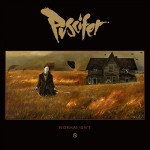
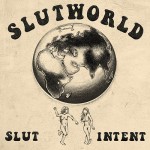
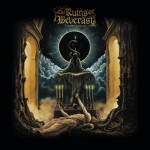












![[7+7]: Μουσικές στον κινηματογράφο, Vol. 2025](https://images.rocking.gr/cine/2026/150x150/movies2025-cover.jpg)



















